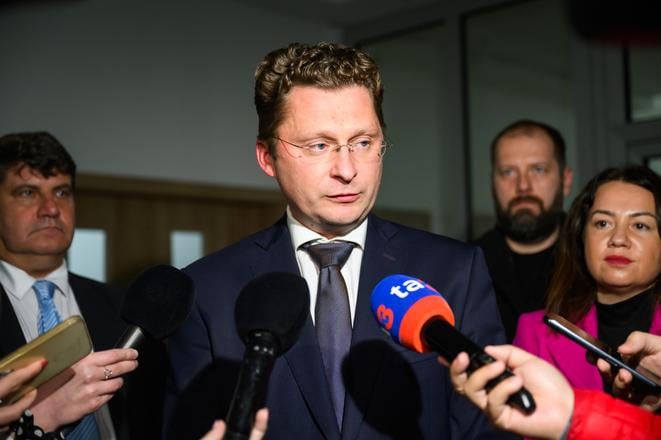Nearly 2,500 hospital doctors in Slovakia are preparing to resign at the end of October, escalating an already fraught situation in the country’s healthcare system. Peter Visolajský, head of the doctors’ union, announced that unless the government reaches an agreement with them, these doctors will not return to work in the new year.
The impending resignations, which involve medical staff from both public and private hospitals, are likely to cripple critical departments.
Visolajský has called on Prime Minister and Smer party leader Robert Fico and Health Minister Kamil Šaško of the Hlas party to begin negotiations, writes Denník N. Despite the government’s pledge of an additional €100 million to raise healthcare salaries, presented last Friday, Visolajský maintains that wages are not the primary issue. Instead, he emphasises the systemic collapse of Slovakia’s healthcare system, citing chronic understaffing and deteriorating working conditions.
Šaško has promised that nurses and paramedics will see their salaries increase according to the original plan, but doctors have been offered only a 6.4-percent raise, below the 9.7-percent stipulated by law. Visolajský has been vocal in his criticism, highlighting the government’s push to convert hospitals into joint-stock companies — a move he describes as veiled privatisation.
“This is where we draw the line,” he stated, referencing the union’s 2022 agreement with the previous government.
Nurses have also expressed dissatisfaction, asserting that without doctors, their own roles become untenable. They rejected any proposed changes to the legislation governing healthcare pay. Meanwhile, Visolajský has raised concerns about the lack of investment in nursing education and the ongoing exodus of nurses from the profession.
Mass resignations by doctors are not unprecedented in Slovakia. In 2011, during the administration of Prime Minister Iveta Radičová, doctors took similar action, leaving the government scrambling to negotiate. More recently, in 2022, doctors threatened to resign but reached an agreement with then-Prime Minister Eduard Heger before the deadlines took effect.
Minister makes videos, doctors criticise big firms
In an effort to calm tensions, Šaško has posted videos online, asking doctors to understand the necessity of fiscal consolidation. He argues that the proposed salary increase is still above the national average, noting that doctors would see their monthly wages rise by €164. He acknowledged, however, that there is a €62 gap between what the union is demanding and what the government is offering.
“I hope €62 isn’t the reason patients should face instability,” he remarked.
Visolajský has also cited financial mismanagement as the real issue, not wages. He noted that some of Slovakia’s wealthiest individuals, including Tomáš Chrenek of Agel and Jaroslav Haščák of Penta Group, have profited from healthcare, while public hospitals have been generating debts. The union has consistently pressured the government to deal with how much funding health insurance companies allocate to hospitals. One of the private health insurers, Dôvera, is owned by Penta.
Moreover, Slovakia’s Antimonopoly Office is currently suspecting Agel and Penta, which own a number of hospitals in Slovakia, of cartel activity; Penta and Agel deny the accusations.
Visolajský has also criticised the government’s decision to halt construction of the long-delayed Rázsochy hospital in Bratislava. Former Health Minister Zuzana Dolinková (Hlas) opted to move the project to Ružinov, another Bratislava borough, a decision Visolajský claims benefits private healthcare providers, particularly Penta, which operates a hospital near the Rázsochy area.
PM Fico ignores doctors
Despite the mounting discontent, Prime Minister Fico has not met with the doctors’ union to date. He has publicly backed Minister Šaško’s approach and reassured nurses and paramedics, but not doctors, that their pay will not be affected by the fiscal consolidation.
Šaško’s predecessor, Zuzana Dolinková, stepped down at the start of October because she disagreed with fiscal consolidation measures affecting health workers and did not feel supported by Fico.
The union continues to demand negotiations, accusing the government of ignoring their concerns. The minister said on Tuesday that he is ready to negotiate with doctors.
“We’ve written to the prime minister three times, but there has been no response,” Visolajský said.
After the adoption of consolidation measures, Smer is slowly losing popularity, according to polls. The latest Ako poll, published on October 21, shows that Smer’s popularity has fallen from 22.8 percent in September to 21.3 percent this month. An earlier poll by NMS Market Research showed a similar trend.
Doctors quitting their jobs in hospitals would not contribute to Smer’s appeal.


 Chair of the Medical Trade Union Association (LOZ) Peter Visolajský after a meeting with Health Minister Kamil Šaško (Hlas) in Bratislava on October 14, 2024. (source: TASR - Jaroslav Novák)
Chair of the Medical Trade Union Association (LOZ) Peter Visolajský after a meeting with Health Minister Kamil Šaško (Hlas) in Bratislava on October 14, 2024. (source: TASR - Jaroslav Novák)